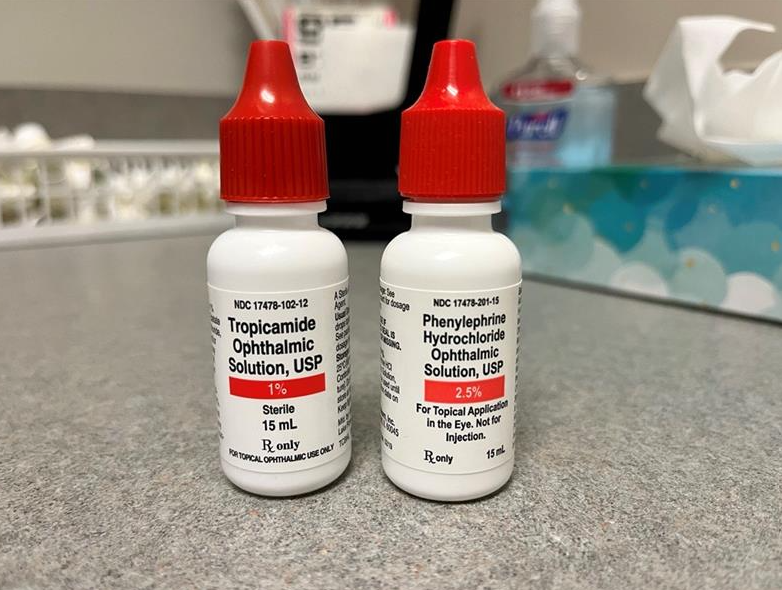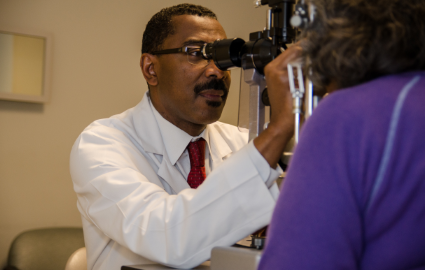Why is Dilating my eyes important for my comprehensive retina exam?
Why is Dilating my eyes important for my comprehensive retina exam?
Dilation is an important factor to your comprehensive eye exam at Tennessee Retina. At almost every visit, both of your eyes are usually dilated if you are scheduled for a comprehensive retina exam. Dilation allows the doctor to have a good, full view to the back of the eye. This view will include your retina and optic nerve. Dilated pupils are necessary for the doctor to look into your eye more completely in the exam room and are important for clearer imaging that may need to be performed at your visit. With your pupils dilated, the doctor has a better view to the back of your eye to assess the health of your eye and make a diagnosis.
What is Dilation?
Dilation is the act of something becoming bigger or larger. In our office, we perform pupil dilation. The pupil is the black part in the middle of your eye. Pupil dilation occurs when that center of your eye grows larger, which will allow more light in. Dilation could be compared to looking through a bigger window to have a better view.
Typically, we will dilate your eyes by using two eye drops called Tropicamide and Phenylephrine. These two drops have a red top labeling them as a dilation drop, and they cause the muscles responsible for pupil movement to relax, causing the pupil to enlarge. This allows the pupil to remain large even under bright light, which would usually cause the pupil to restrict, or get smaller. Dilation drops can burn when they go in the eye, so we often also use another drop called Proparacaine (a numbing drop) before the dilation drops because it burns less and numbs the eye, making the dilation drops much more tolerable. It usually only takes one drop of phenylephrine and one drop of tropicamide in each eye to dilate your pupils. We will then take you to our dim waiting area. The dimmer light in the waiting area will help with dilation and be more comfortable for you since you will be light-sensitive while you are dilated.
Dilation typically takes around 20-30 minutes before your pupil will be fully dilated. Your pupil will be dilated for around 3-5 hours, but duration can vary. Please remember to bring sunglasses to your exam. Because your pupils cannot restrict, your eyes will be very light sensitive while your eyes are dilated. If you forget sunglasses, no worries, we can provide a temporary pair of dark shades that fit on your face or even behind your glasses at check out.

Why Is Dilation Important?
Pupil dilation is essential for the doctor to perform a thorough exam of your retina. For most conditions we treat, dilation is crucial for your diagnosis and possible treatment plan. The drops mentioned above help make your pupil large and not constrict when the pupil is exposed to light. So, the doctor can shine a bright light through your dilated pupil and have an open, well-lit view to your retina to be able to diagnose and create a treatment plan if needed.
Did you know that the eye is the only part of the human body that a doctor is able to view the central nervous system? Having a view of the optic nerve is an important part of your exam also. With pupil dilation, it becomes possible for your doctor to view your retina and optic nerve.
There are also Important Tests to be Performed before your Eyes are Dilated
Dilation is very important, but there may also be important tests performed before dilation. Some tests are important to be performed with a non-dilated eye. You will get your vision checked in the exam room before dilation. Vision tests are important to do before dilation because blurriness or light sensitivity from dilation may skew accuracy. Vision testing may include checking your distance vision, your near (or reading) vision, or even color vision tests before dilation. Testing pupil reaction during a comprehensive exam must also be performed before dilation. This is a very important step because abnormal pupil reaction can sometimes be a sign of other health conditions.
Glaucoma patients may have an angle test done at the slip lamp before dilation. The angle test done before dilation is important for glaucoma patients to make sure it is safe to be dilated. This angle test is typically performed by the doctor. You will always get your pressure checked before dilation. This is also a safety feature before you are dilated. If your pressure in the eye is elevated, the technician will check with the doctor or clinic to make sure you are safe to be dilated.

How do your eyes feel while they are Dilated?
Your eyes will be very light sensitive. Your pupils are enlarged, so this allows more light to come in, making your eyes very light sensitive. On a day you are getting your eyes dilated, always remember to bring sunglasses for protection after your appointment. During dilation you may also have blurry vision. Looking at your phone or reading a book may be very difficult while dilated. Some have reported that their eyelids feel tight after dilation, and some people experience slight irritation and watering after being dilated.
Everyone is different and experience the effects from being dilated differently. Until you are familiar with how your eyes react, we strongly recommend that you bring someone with you to your appointment to drive you home, especially if it is your first time being dilated.
Dilation is not fun but is essential for a thorough exam of your retina and optic nerve. With dilation, the exam performed will help the doctor make a diagnosis and create a treatment plan that could potentially prevent possible vision loss or progression of disease. Dilation is a temporary effect to endure in order to help you maintain healthy vision. If you have questions about dilation, don't hesitate to ask your technician or your doctor. Your comfort and your health are our top priority at Tennessee Retina.
